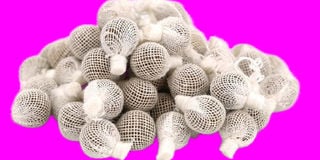
Yoni Pearls popularity is driven by aggressive influencer marketing and the algorithms of social media platforms.
| ShutterstockNews
Premium
The Yoni Pearl craze: Inside online health scams
History is littered with wonder drug scams selling miracle solutions to ailments. The latest newcomer to town is the Yoni Pearl; a product advertised as a vaginal detoxifying agent that has taken the Kenyan market by storm.
Driven by aggressive influencer marketing and the algorithms of social media platforms, the Yoni Pearl has become the go-to solution for many Kenyan women seeking answers to reproductive health issues such as recurrent yeast and bacterial vaginosis infections, infertility and polycystic ovary syndrome (PCOS).
One of its users is Caroline Kabole*, a 27-year-old woman who was struggling with recurrent yeast infections when she came across an advertisement for Yoni Pearls on her Instagram timeline.
I knew that if I went to a gynaecologist, they would recommend antibiotics, which I didn't want. I was browsing through my Instagram feed when I came across a post from MyhappyVagina that said yoni pearls could detoxify the vagina using natural ingredients. I decided to take a chance on them," she says.
My Happy Vagina is an Instagram account with about 69,000 followers that claims to sell natural feminine care products. One of its most popular products is the yoni pearl.
I bought a set of three pearls from the page for Sh1000. From the little research I did, I knew that the pearls contained natural herbs that were meant to naturally detoxify your vagina," Caroline adds.
According to Myhappyvagina's Instagram highlights, the pearls are said to contain natural ingredients such as feverfew, angelica and osthol.
"I would insert the pearls into my vagina on alternative days. After a while, they dissolve inside the tract and you feel a pulling effect inside you. I used three pearls in six days after which I started producing a lot of discharge which at times would contain blood clots. I suppose the pearls worked because they cleaned my uterus,'' Caroline says.

The Yoni Pearl used as a vaginal detoxifying agent.
The Nation spoke to several gynaecologists who debunked the idea that yoni beads could detoxify the vagina. Dr John Odero Ongech, a gynaecologist, clarified that there was no scientific backing for such commercial claims.
What Caroline* (the yoni pearl user) probably experienced was leukorrhoea (abnormal and excessive vaginal discharge) triggered by the use of the pearls. The vagina is self-cleaning and does not need external products to be clean or detoxified," he added.
Dr Ongech added, the use of yoni beads could cause further pH imbalance and vaginal irritation, creating an environment conducive to diseases such as vaginosis and vaginal cancer.
Yet, Kenyan women are still fascinated and bombarded with advertisements for the wonders of yoni pearls on social media. According to an investigative report published by Fumbua titled 'Online Health Scams for Sale: How Google, Facebook, YouTube and Instagram Allow Dangerous Health Products to be Targeted at Kenyan Women', rampant misinformation and disinformation on social media platforms enable the sale of reproductive health scams such as the yoni pearl to Kenyan women by failing to control dangerous content and protect vulnerable users.
The investigation found that approximately 200,000 posts on Instagram with #yonipearls were visible in the platform's 'recent' posts when a mobile search for yoni pearls was conducted, with the majority of posts reportedly published between mid-2020 and early 2021 by Instagram retailers such as @ladyblossom_ke, @my_happyvagina and @yonipearls_kenya.
Products that dominated the content of these Instagram pages were: yoni pearls, yoni steam and yoni candy. Additionally, content promoting yoni steaming received the most engagement, with a video posted by @my_happyvagina demonstrating how to use a yoni steaming seat garnering 8,554 views.

The Yoni Pearl used as a vaginal detoxifying agent.
On Facebook, yoni beads were found to be promoted to Kenyan women through groups and the platform's marketplace. In some cases, Facebook algorithmically amplified pages and groups that offered harmful vaginal detox products and promised cures for medical problems. The Facebook groups include sellers and buyers of the product and often feature graphic images and testimonials about how the products had cured infertility, although none of the posts carry fact-checking or misinformation labels or links to authoritative health information.
The investigation also identified several monetised videos on YouTube's Kenya site that contained harmful misinformation about yoni beads and vaporisation.
"In one video by content creator 'The Find Guru', who has nearly 800,000 subscribers, she advises women suffering from infertility or menopause to try yoni steaming, and before the video begins, YouTube ran two ads for a Nivea 'anti-dark mark' serum sold on Jumia and another ad for a non-profit organisation asking for donations," the report said.
"YouTube is not only promoting harmful sexual and reproductive health (SRH) misinformation but also profiting from it through advertising revenue. The examples identified in our investigation likely represent just a sample of the monetised YouTube content that contains SRH misinformation targeting women in Kenya,'' the report added.
Although Yoni Pearl's advertisements violate the community guidelines of most major tech companies, such content is still allowed to circulate on their platforms.
Krsistina Wilfore, a global gender and democracy expert and co-founder of #She persisted, an organisation that works to counter disinformation programmes, explained why women are particularly vulnerable to such health scams.
"There are gender dynamics that make women more vulnerable to such health scams. The pressure on women to detoxify their vaginas is part of a growing trend on social media that takes advantage of unequal access to reproductive health information and healthcare,'' she said in an interview with the Nation. 'There is also a cultural expectation for women to maintain a healthy reproductive system in order to have successful relationships. This leads them to seek advice on such issues from social media platforms where these products claim to restore female health.
Ms Wolfore added that such companies profit from women's reproductive health struggles by perpetuating misinformation and disinformation about online health scams on their platforms.
Leah Kimathi, the convener of the Council for Responsible Social Media (CRS), says Kenya can advocate for better regulation through the African Union and regional frameworks such as the East African Community to negotiate with big tech companies.
Meanwhile, medical experts say Yoni Pearls is an online health scam and that women should seek professional help for any reproductive health concerns.
*Name has been changed to protect the privacy of the source.





